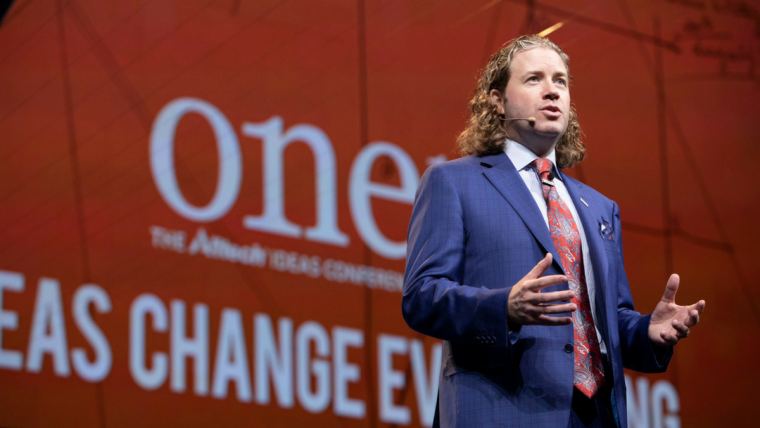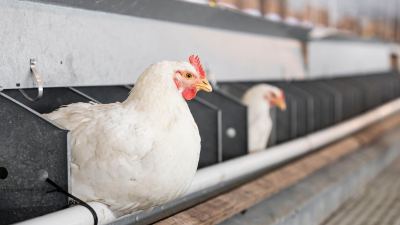Da Vinci and Dr. Pearse Lyons: Geniuses of Renaissance and ag-tech

Amidst his days of sketching ideas for bicycles, parachutes, tanks and submarines, Leonardo da Vinci, a Renaissance genius, ran into obstacles. Nevertheless, da Vinci was well-known for keeping a notebook of his ideas and thoughts, scribbled randomly in the pages. Among these pages lived an affirmation da Vinci repeated during times of innovative struggles: “Obstacles do not bend me.”
Over 500 years later, Dr. Mark Lyons, president of Alltech, took the stage at ONE: The Alltech Ideas Conference. In front of nearly 4,000 people, he told the audience about another genius who was known for documenting all his thoughts in a notebook. Dr. Pearse Lyons, Mark’s late father and founder of Alltech, was a champion of sustainability, brewing, nutrition and innovation. He, too, had an affirmation for when struggles arose: “We will bend reality.”
“If you think it, ink it!” Mark told the crowd. Yet documenting ideas in a notebook isn’t the only similarity that da Vinci and Dr. Lyons shared. According to the book “How to Think Like Leonardo da Vinci” by Michael Gelb, there are seven steps to becoming a genius like da Vinci. Mark explored the seven different ways his father compared to the visionary:
1. Curiosity: Da Vinci was eager to ask “what if” questions: What if humans could fly like birds? What if art could transform the world? Dr. Lyons was known for questioning the status quo, too. Those who knew him were aware of his hard-hitting questions: What if we could reduce animal pollution? What if we could feed animals more naturally? What if we could connect farmers with technology?
2. Demonstration: The ability to learn from his mistakes was an admirable trait of da Vinci’s. Part of innovation, part of building an empire, is testing knowledge through experience.
“He didn’t believe he was any better than anyone else,” said Mark of his father. “He didn’t believe he was completely unique. He was humble.”
3. Sensation: In an age when technology lives at our finger tips, what would da Vinci, a supporter of using all five senses, think about people glued to their phones? Dr. Lyons invested much time and effort into his two homelands, Kentucky and Ireland, by hosting worldwide events and building beautiful distilleries. This commitment to his communities helps encourage people to get off their phones and into the world.
4. Smoke: A willingness to embrace uncertainty. Da Vinci, a genius, recognized that there were still topics unknown to him. However, the excitement to learn something new is an important step on the road to genius. Dr. Lyons was known for cultivating a spirit of curiosity within himself and within others by funding graduate programs, conferences and language classes for his employees.
“Learning never exhausts the mind,” da Vinci once said.
5. Art/science: Often, people describe themselves as “right-brained” or “left-brained” — art-driven or science-driven. However, to achieve the genius of da Vinci, it’s important to find a balance between the two. Da Vinci was an artist, yes, but he was also an engineer, a botanist and an inventor. Dr. Lyons was a scientist who was gifted in fermentation, but he also was a man with a highly developed palate and a creative mind that crafted award-winning beer. The key is balance.
6. The body: “Your mind follows your physical state,” da Vinci said.
Da Vinci and Dr. Lyons were firm believers that an alert body leads to an alert mind, which is why Dr. Lyons went running each morning and even hosted runs at Alltech’s annual international conference. He clearly recognized the importance of happy, healthy employees.
7. Connection: Da Vinci connected to the world, to his environment, to his art. However, Mark emphasized that Dr. Lyons was more interested in connecting with people.
“He constantly wanted to connect and bring people together,” explained Mark.
The similarities between Leonardo da Vinci and Dr. Pearse Lyons are striking. However, there is an overall theme between the two men: a sense of purpose. For da Vinci, a purpose to create. For Dr. Lyons, a purpose to sustain the world.
“Today, people will work for purposeful companies and purposeful institutions,” said Mark. “And if you don’t have a purpose, they won’t work for you at all.”
Ultimately, these two geniuses have set the standard high. Perhaps not everyone can be a da Vinci or a Dr. Lyons, but these steps can lead us to find our own ONE big idea.
“We cannot replace Dr. Lyons, nobody can,” Mark told the crowd. “But if we start to think like him, if we can get 10 people, 100 people, 1,000 people thinking like him, imagine what we can achieve together.”















